Evil, Suffering, and the Crisis of Faith
Thomas G. Long




cup overflows." (Ps. 23:5)
ix
xi
 his bookbegan as the 2009 Thomas White Currie Lectures at Austin Presbyterian Theological Seminary in Austin, Texas. To participate in such a distinguished series, which includes in its lineage H. Richard Niebuhr's classic Christ and Culture, was more than an honor. It was a thrill. I am grateful to Dr. Theodore Wardlaw, Austin's president and a dear friend of long standing; to Dean Michael Dinkins, now president of Louisville Presbyterian Theological Seminary; to my kind hosts, Professor David White and his wife, Melissa Wiginton; and to all of the many others in Austin who made the seminary campus a place of hospitality and welcome. I am also grateful to the members of the Tom Currie Bible Class of the Highland Park Presbyterian Church in Dallas, Texas. They are not only the longtime sponsors of the Currie Lectures; they also provided me a Saturday evening feast and a Sunday morning forum to try out a few ideas from the lectures.
his bookbegan as the 2009 Thomas White Currie Lectures at Austin Presbyterian Theological Seminary in Austin, Texas. To participate in such a distinguished series, which includes in its lineage H. Richard Niebuhr's classic Christ and Culture, was more than an honor. It was a thrill. I am grateful to Dr. Theodore Wardlaw, Austin's president and a dear friend of long standing; to Dean Michael Dinkins, now president of Louisville Presbyterian Theological Seminary; to my kind hosts, Professor David White and his wife, Melissa Wiginton; and to all of the many others in Austin who made the seminary campus a place of hospitality and welcome. I am also grateful to the members of the Tom Currie Bible Class of the Highland Park Presbyterian Church in Dallas, Texas. They are not only the longtime sponsors of the Currie Lectures; they also provided me a Saturday evening feast and a Sunday morning forum to try out a few ideas from the lectures.
Subsequently, the lectures were adapted and delivered at the Closterhouse Colloquium at Northminster Presbyterian Church in Indianapolis, where the pastor, Dr. Teri Thomas, and the Closterhouse Committee, chaired by the ever-gracious Jean Dodds, provided far more care and encouragement than I deserved. Additionally, versions of these lectures were delivered as the 2010 Nicholson Lectures at the Atlantic School of Theology in Halifax, Nova Scotia. I am grateful to the school's president, the Reverend Canon Eric Beresford, for the kind invitation to be a part of this distinguished series, and to DeWolfe, professor of pastoral theology, for his generous hosting of me and for using his preacher's gift to regale me with wonderful stories.
My editor, Roger VanHarn, has been my friend and conversation partner about preaching for many years. I am grateful to him for guiding this project forward, and I want to thank Bill Eerdmans and the good team at Eerdmans Publishing Company for the wonderful support they have provided.
I wish as well to express my gratitude to Dean Jan Love and my other colleagues at Candler School of Theology at Emory University. The intellectual ethos of Candler is a constant and encouraging stimulus to rigorous, faithful, and creative scholarship. In particular, I wish to thank Carl Holladay, Luke Timothy Johnson, Steven J. Kraftchick, Joy Ann McDougall, Carol Newsom, Gail O'Day (now dean of the Wake Forest University School of Divinity), Karen Scheib, and Andrea White, colleagues whose writings and whose theological conversations with me are reflected in the ideas in these pages, even if they may not always recognize them. My research assistant, Sarah Reddish, has provided great help in preparing the manuscript.
An earlier version of the chapter of this book titled "Interlude: Howl: Job and the Whirlwind" appeared as "Job: Second Thoughts in the Land of Uz" in Theology Today (April 1988): 5-20. It is used here by permission.
 n Archibald MacLeishs Pulitzer prize-winning play J.B., two workers at a fleabag circus, a "Mr. Zuss, who sells balloons, and "Nickles, who is a popcorn vendor, mount a deserted sideshow stage and, after some hesitation, decide to act out the biblical story of job. Zuss will play the part of God; Nickles will be Satan. What about the character of job, the agonized sufferer? The two men observe wryly that there is always some human being to play job.
n Archibald MacLeishs Pulitzer prize-winning play J.B., two workers at a fleabag circus, a "Mr. Zuss, who sells balloons, and "Nickles, who is a popcorn vendor, mount a deserted sideshow stage and, after some hesitation, decide to act out the biblical story of job. Zuss will play the part of God; Nickles will be Satan. What about the character of job, the agonized sufferer? The two men observe wryly that there is always some human being to play job.
Nickles begins to recite a little poem, naming the theme that will serve as the main challenge of the play:

i. Archibald MacLeish, J.B.: A Play in Verse (New York: Houghton Mifflin, 1989), p. ii.
MacLeish wrote J.B. in the mid-1950s, in response to the devastations of two world wars and the other horrors of the twentieth century, and his play sparked a conversation among playgoers and in the popular media about the character of God. Is God good? If so, given the scope of suffering, can we think of God as all-powerful?
These questions, taken together, have been called the "theodicy problem." As theological terms go, theodicy is a relative newcomer, having been invented by the philosopher Leibniz only three hundred years ago. Etymologically, the word theodicy is formed by gluing together two Greek words, theos (God) and dike (justice), and in its original sense it meant "the justification of God:' In a world where terrible catastrophes happen and where people suffer out of all proportion to any sense of deserving, God, it was felt, had some explaining to do. The ways of God needed to be justified. God needed a good defense, and theodicy was the enterprise of coming up with one.
This book is about what preachers can and should say regarding the theodicy problem. Engaging theodicy in the older sense of the word is not my goal, and providing a justification for the actions of God is not what I imagine myself to be doing in these pages. Indeed, to think that one could somehow defend God is theologically an act of extreme hubris. If God needs to be defended, God will need a better attorney than I.
More recently, though, theodicy has come to have a somewhat different meaning, one that is less about putting God on trial and more about putting our faith to the test. In this newer sense, which is the concern of this book, theodicy is about how believers can hold together important faith claims that seem, on the surface anyway, to be incompatible: that there is a God, that God is loving and just, that God is powerful, and that there is undeserved suffering in the world. Understood this way, theodicy is not about coming up with excuses for God's behavior in a world of evil but about how faith in a loving God is plausible, given what we know and experience about suffering.


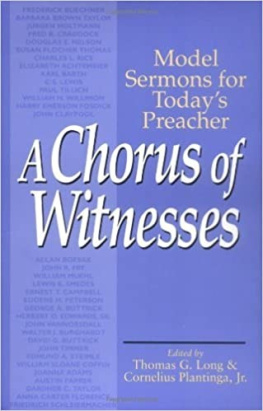

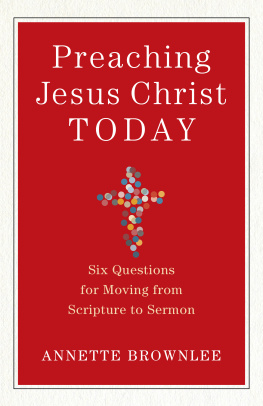
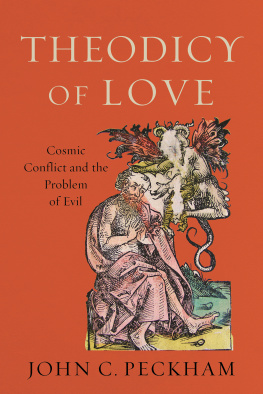
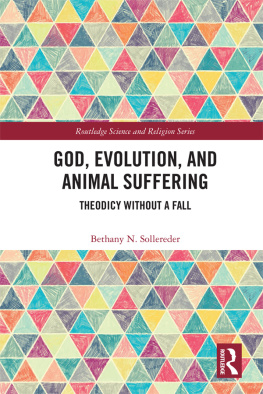

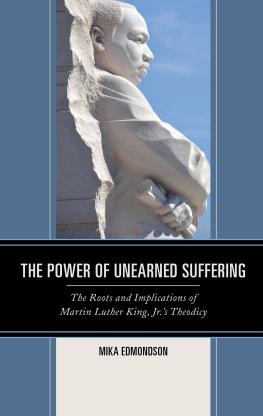
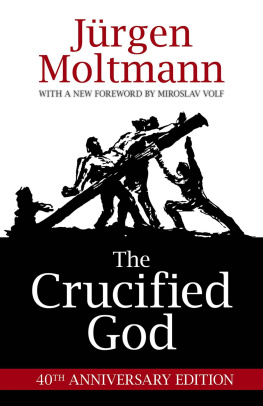

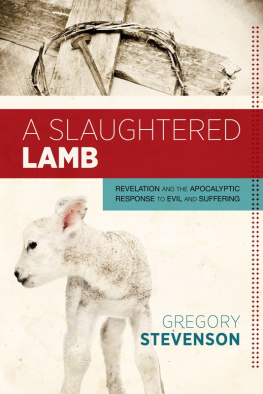




 his bookbegan as the 2009 Thomas White Currie Lectures at Austin Presbyterian Theological Seminary in Austin, Texas. To participate in such a distinguished series, which includes in its lineage H. Richard Niebuhr's classic Christ and Culture, was more than an honor. It was a thrill. I am grateful to Dr. Theodore Wardlaw, Austin's president and a dear friend of long standing; to Dean Michael Dinkins, now president of Louisville Presbyterian Theological Seminary; to my kind hosts, Professor David White and his wife, Melissa Wiginton; and to all of the many others in Austin who made the seminary campus a place of hospitality and welcome. I am also grateful to the members of the Tom Currie Bible Class of the Highland Park Presbyterian Church in Dallas, Texas. They are not only the longtime sponsors of the Currie Lectures; they also provided me a Saturday evening feast and a Sunday morning forum to try out a few ideas from the lectures.
his bookbegan as the 2009 Thomas White Currie Lectures at Austin Presbyterian Theological Seminary in Austin, Texas. To participate in such a distinguished series, which includes in its lineage H. Richard Niebuhr's classic Christ and Culture, was more than an honor. It was a thrill. I am grateful to Dr. Theodore Wardlaw, Austin's president and a dear friend of long standing; to Dean Michael Dinkins, now president of Louisville Presbyterian Theological Seminary; to my kind hosts, Professor David White and his wife, Melissa Wiginton; and to all of the many others in Austin who made the seminary campus a place of hospitality and welcome. I am also grateful to the members of the Tom Currie Bible Class of the Highland Park Presbyterian Church in Dallas, Texas. They are not only the longtime sponsors of the Currie Lectures; they also provided me a Saturday evening feast and a Sunday morning forum to try out a few ideas from the lectures.
 n Archibald MacLeishs Pulitzer prize-winning play J.B., two workers at a fleabag circus, a "Mr. Zuss, who sells balloons, and "Nickles, who is a popcorn vendor, mount a deserted sideshow stage and, after some hesitation, decide to act out the biblical story of job. Zuss will play the part of God; Nickles will be Satan. What about the character of job, the agonized sufferer? The two men observe wryly that there is always some human being to play job.
n Archibald MacLeishs Pulitzer prize-winning play J.B., two workers at a fleabag circus, a "Mr. Zuss, who sells balloons, and "Nickles, who is a popcorn vendor, mount a deserted sideshow stage and, after some hesitation, decide to act out the biblical story of job. Zuss will play the part of God; Nickles will be Satan. What about the character of job, the agonized sufferer? The two men observe wryly that there is always some human being to play job.